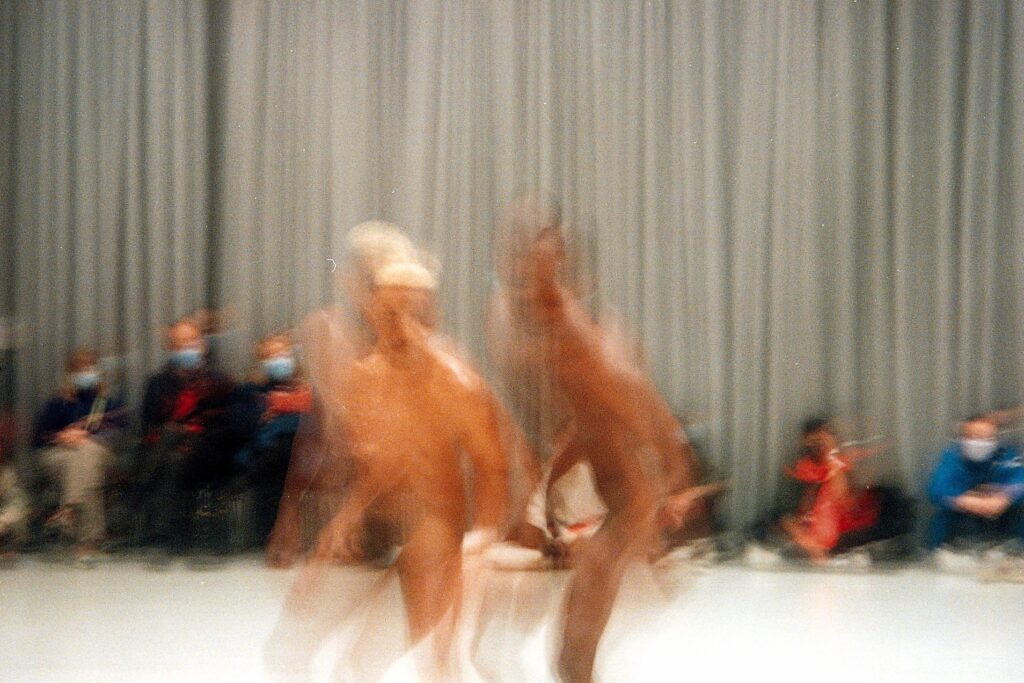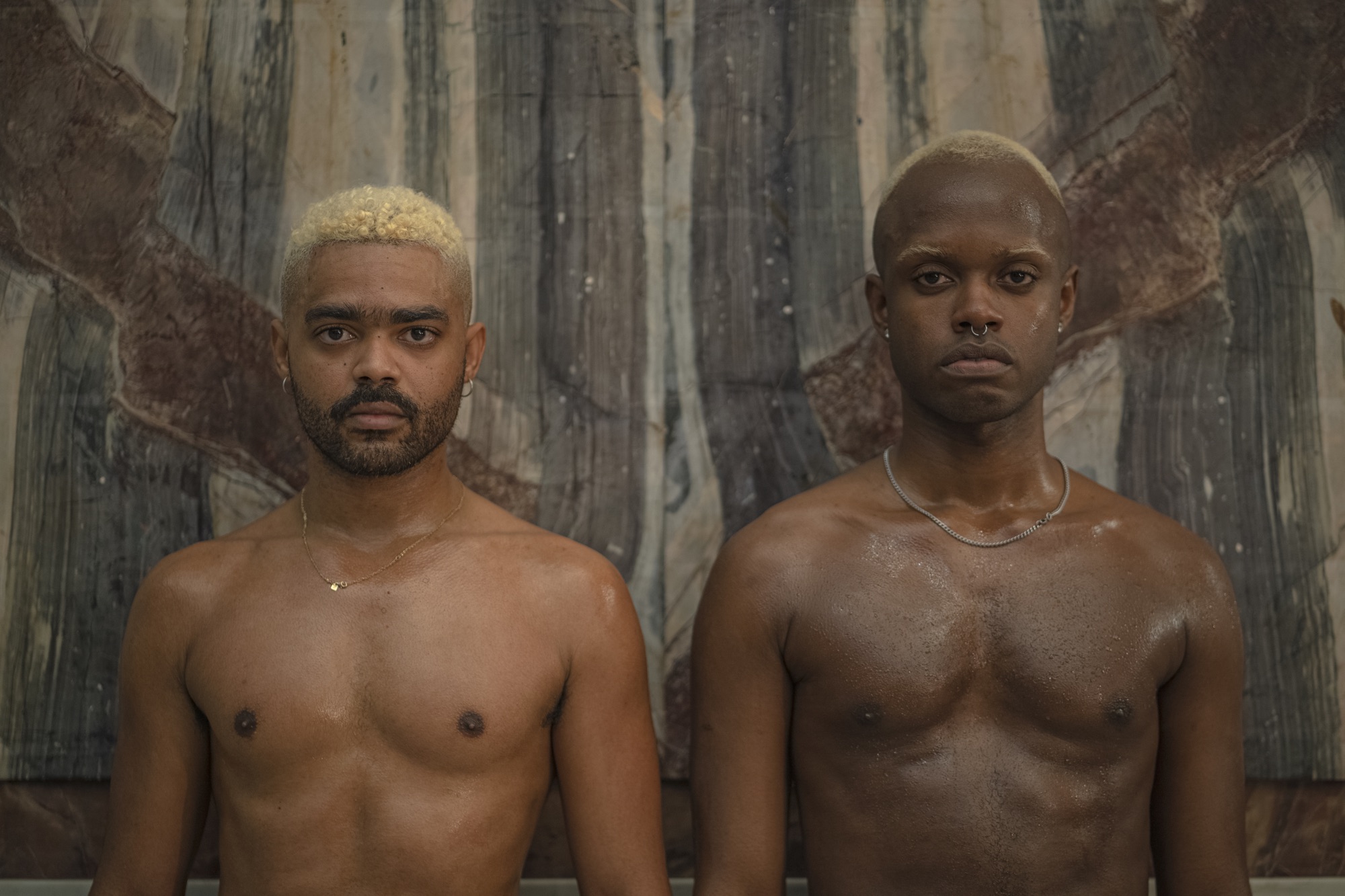Words by Paula Catalina Riofrio.
Repertório N.1 is the final piece of the trilogy choreographed and performed by Davi Pontes and Wallace Ferreira. The performance takes place at Porchester Hall, London on the 18-19 October 2025, as part of Dance Umbrella festival and Serpentine’s live programme, to start their international tour in 2026. The work is co-commissioned by Serpentine and Dance Umbrella (UK), Something Great (Germany), Wiener Festwochen (Austria), Arsenic (Switzerland) and Viernulvier (Belgium).
I had the pleasure to interview Davi who helped translate from English to Portuguese to Wallace. This interview is a coalescence of their answers; reflection on the process and the context of Repertório.
We learned to work with fragility, we learned about time, we learned to refuse, we learned to distance ourselves from what it means to build a dance work and come from a context like Brazil.
PC: How do you know each other?
We first met in 2018, in Rio de Janeiro. Interestingly we didn’t know each other before we started working together though we did follow each other on Instagram. Later that year, I invited Wallace to perform a version of a piece that eventually became part of the trilogy we now call Repertório. At that time, I was studying visual arts and Wallace was studying dance. These two worlds collided and gave us the foundation for the work we’ve been developing ever since.
PC: What was it that made the first step of the performance?
This project emerged specifically from the historical context of Brazil at that time. Under President Bolsonaro, we were facing a climate of great insecurity as policies became increasingly hostile towards minorities. That was when the word self-defense emerged — it felt like the only possible demand at thatmoment. It’s strange to reflect on this now, as Bolsonaro faces trial for various crimes, the most serious being the violent abolition of the Democratic State of Law. Denise Ferreira da Silva, a Brazilian philosopher and artist whom I greatly admire, wrote about how democratic systems are being used to promote anti-democratic acts. Bolsonaro’s imprisonment may signal a kind of justice, although I personally believe that as a principle justice is flawed. Still, it matters that he faces accountability. In some ways, everything he produced during those years still stands: the violence, the radicalism, and the attacks on democracy. For us, the central question that keeps returning in our work is: how do you choreograph self-defense? It’s a question that feels endless — one we’ll never stop asking.
PC: Tell me about the process of creation.
Our creative process is very quiet. Usually, it’s just the two of us in the studio and we build material from suggestions each one of us makes, without much discussion. We listen to each other and push those suggestions to their limits.
Repertório is a work that demands a very specific kind of physicality and as the trilogy evolved, the work became even more physical than we had initially expected. That’s why we approach the actions with such intensity. Across all the trilogy, there are poses and heavy stomps against the ground, which can be read as erotic, as military, or as referring to dances from a specific Brazilian context or elsewhere. What interests us is creating images and seeing how they are transformed as people believe, doubt, refuse, or identify with them. We don’t use any specific contemporary dance technique; the actions develop more like performance art, from prompts and tasks. Repertório is about company, but not in the sense of a dance company. It’s about a radical partnership between us. Even though we are completely different, as a duo we create a very specific kind of ethics for being together. We never watch ourselves in videos, for example; we learn by observing one another. When the audience enters, everything transforms, because we never know what will happen. Each day, the work reveals itself new mysteries, and it’s in that mystery that we place our trust.
PC: Brazil, dance and relationships; what would you like to share about that?
We were recently talking about something that might help answer this question. Back in 2018, when we began the project in Brazil, our biggest wish was to develop it through funded artist residencies. This felt completely out of reach at the time because we could only use the gaps in our universities’ schedules and spaces to work.
Most of Repertório No. 3 was created outside Brazil, during residencies in different parts of the world. It premiered at the 35th São Paulo Biennial, Choreographies of the Impossible, in 2023, curated by Hélio Menezes, Grada Kilomba, Diane Lima, and Manuel Borja-Villel. We would like to take the opportunity to express our affection and admiration for Hélio Menezes and Diane Lima, who believed in our project.
We felt that the final part of the trilogy, Repertório No.1, should be done here, in Brazil, and we worked hard to make that possible. When I read those 3 words Brazil, dance, and relationships together, it gives me a sense of vertigo because of their complexity. We’ve been performing Repertório No. 3 for two years, and yet it will only be presented in Rio de Janeiro, our home city, at the end of this year.
That says a lot about the relationship between those three words. I don’t think our work could exist only within this context; knowing we’ve managed to do the impossible is both exhilarating and terrifying.

PC: Is there a lot of your persona in this piece or what can you tell me about the character you embody?
I think a lot of our personalities are present in the work, and they really come through in our encounters with the audience. When someone in the audience rejects, doubts, or ignores what’s happening, it demands a certain sensitivity from us to not let ourselves be dominated by these feelings and react impulsively. Instead, we have to hold the material together. The repertoire does allow space for choice, but that doesn’t mean it’s improvised.
PC: What sparks curiosity in you after every performance?
In truth, I feel more curious before a performance. Even if I’ve performed a piece more than 100 times, I still feel nervous beforehand. I think it’s that sense of not knowing what’s coming, or what might unfold in the encounter. Honestly, after the performance I just want to relax. The work itself can generate tension, but once it ends, it’s over. We never wanted to create something that would weigh on us. Still, I sometimes find myself wondering: what happens after everything has already been said and done?
PC: What have you learned from this process?
This work began seven years ago and I believe it was the work that saw us transform. We learned to work with fragility, we learned about time, we learned to refuse, we learned to distance ourselves from what it means to build a dance work and come from a context like Brazil. We learned about company, to believe in small revolts. We learned that there are things that are non-negotiable for us.
Repertório N.1 comes to Porchester Hall on 18-19 October as part of Dance Umbrella festival and Serpentine’s live programme. Book here.
